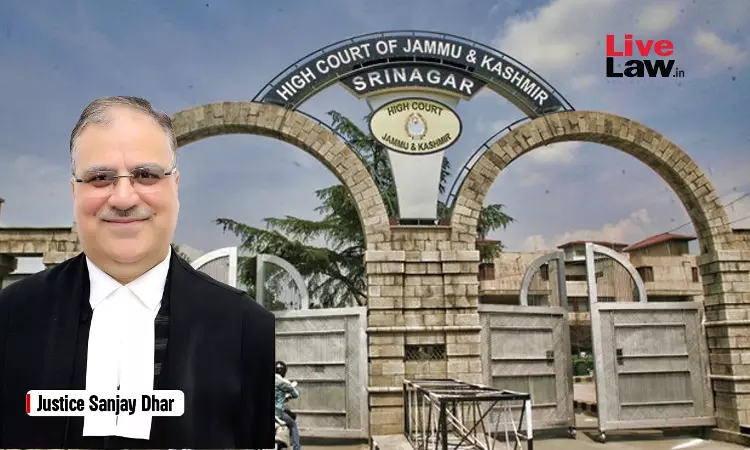- Home
- /
- High Courts
- /
- High Court of J & K and Ladakh
- /
- Working Of Courts Was Hampered...
Working Of Courts Was Hampered Post-Abrogation Of Article 370 & COVID-19: J&K&L HC Allows Production Of Witnesses At Stage Of Final Arguments
Syed Nazarat Fatima
26 July 2025 8:00 PM IST
A Single Judge Bench of the Jammu & Kashmir and Ladakh High Court comprising Justice Sanjay Dhar has held that the power under Section 540 of the J&K CrPC can be exercised at any stage of inquiry, trial or other proceedings.It was held that the Trial Court had failed to consider the situation that had arisen due to the abrogation of Article 370, followed by the outbreak of...
A Single Judge Bench of the Jammu & Kashmir and Ladakh High Court comprising Justice Sanjay Dhar has held that the power under Section 540 of the J&K CrPC can be exercised at any stage of inquiry, trial or other proceedings.
It was held that the Trial Court had failed to consider the situation that had arisen due to the abrogation of Article 370, followed by the outbreak of the COVID-19 pandemic in Jammu and Kashmir, while disallowing the production of witnesses.
Background
An FIR was registered against the Petitioner for offences under Section 420, 468 and 471 of RPC. The proceedings remained pending before the Trial Magistrate since 2014. The Trial Court closed the evidence by an order dated 13-10-2015 owing to the fact that the prosecution had defaulted in producing its witnesses. Subsequently, the prosecution filed an application under Section 540 of J&K Cr.PC before the Trial Court seeking to summon additional witnesses. The Trial Court dismissed the application on 18-12-2015.
Aggrieved, the Petitioner moved the Jammu and Kashmir and Ladakh High Court. The High Court allowed the petition by virtue of an order dated 20-03-2019 and directed the prosecution to produce all the remaining witnesses within four dates. However, despite the said direction, the prosecution could not produce all the witnesses and two witnesses remained unexamined. Resultantly, the Trial Court closed the evidence by an order dated 27-02-2020. The Court proceeded with recording the statement of the accused under section 342 J&K CrPC, followed by defence evidence. At this stage, the matter was kept for final hearing by the Trial Court.
The prosecution filed another application under Section 540 CrPC seeking permission to examine the remaining witnesses which was dismissed on 29-04-2023 by the Trial Court. Aggrieved, the Petitioner approached the High Court of Jammu and Kashmir. And Ladakh.
Contentions of the Petitioner
It was contended that after the prosecution was permitted to produce the remaining witnesses on four dates, the same could not be proceeded with due to the abrogation of Article 370 of the Constitution of India, leading to an abnormal situation in the then State of Jammu and Kashmir. Contending further that the situation got only worse with the outbreak of the COVID-19 pandemic, it was stated that the production of the witnesses before the Trial Court was not possible.
The Counsel contended that the aforementioned circumstances leading to difficulty in producing witnesses could only be attributed to the abnormal circumstances, and the same was not taken into consideration by the Trial Court while rejecting the application of the prosecution that sought permission to produce the witnesses. It was further submitted that the witnesses that were yet to be examined were important with regard to the proceedings and excluding them would lead to a grave miscarriage of justice. Making these contentions, the Counsel asked for an opportunity to produce the witnesses so as to meet the ends of justice.
Findings of the Court
The Court cited Section 540 of the J&K CrPC, which states that a criminal court has the power to call or recall any person as a witness if their testimony is important for a fair decision in the case. It was held that such power can be exercised by the criminal court at any stage of inquiry, trial or other proceedings under the Code.
The Court further ruled that the proceedings being at the stage of final arguments would not necessarily serve as a ground for the court to decline the application of the prosecution for the summoning of the witnesses.
Noting the lethargy of the prosecution, the Court held that the prosecution had failed to produce the witnesses with reasonable dispatch despite being given an opportunity in the earlier round of litigation. However, the Court also acknowledged the fact that the events mentioned by the Counsel for the Petitioner did play a role in preventing the prosecution from producing the remaining witnesses. It was further held that during the Pandemic, the witnesses were reluctant to appear before the court owing to the fear of spreading the disease.
Additionally, the court pointed out that since one of the witnesses was a government officer, it was imperative for the Trial Court to issue a summons for seeking his attendance before the court, and since the same was not followed, the Evidence could not have been closed.
Making these observations, the Court set aside the order of the Trial Court dated 29-042023 and it was ordered that the process of recording statements of the remaining witnesses be completed within one month from the trial court within one month from the date of receipt of the order passed by the High Court.
Case Title: Parveena Banoo versus Mohammad Iqbal Qureshi and Anr.
Counsel for the Petitioner: Mr. Hasnain Khawja, Advocate.
Counsel for the Respondent: Ms. Nadiya Abdullah, AC.



